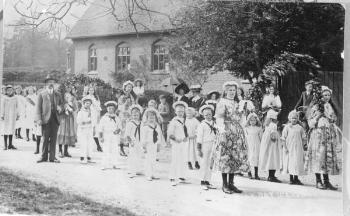Old Village Customs in Northill
Bedfordshire and Luton Archives and Records Service has some typescript notes compiled by a Miss M. Marsom in November 1935 "for Mr. H. C. Shearman's Local History class" [CRT130Northill6]. These notes detail different local customs throughout the year and were written at a time when they were either still extant or, at least, had last occurred within living memory. What follows below is an edited version of Miss Marsom's research:
Plough Monday
This was in early January, the first Monday after Epiphany, which falls on 6th January. It had not been observed in Northill "for a good many years but some older people remember it". The young men blacked their faces, decorated their hats with ribbons and carried a plough. Some carried brooms with which they swept in front of the houses where money was given them but if they received no money the door step was ploughed up.
Saint Valentine's Day
Which, of course, falls on 14th February. This custom lapsed around 1900: boys and girls would go around singing a song at all the bigger houses and were given small coins and, in some cases, buns. From some houses hot farthings were thrown.
Shrove Tuesday
The day before the beginning of Lent: in Northill children went "Ekey Peekying". They would cut two long briars and carried them in arches whilst processing along the road, skipping through the arches and singing. Miss Marsom noted: "They went to Old Warden and the boys fought the Warden boys and the girls returned home alone".

May Day at Ickwell [Z50/84/15]
May Day
On 1st May several customs were observed. Children would go garlanding, a garland being, typically, a wooden hoop over which a white cloth was stretched. A looser piece of cloth was fastened at the top which was used to cover the finished garland. Two dolls were fastened in the middle, one large and one small. Ribbons were sewn around the front edge and the rest of the space was filled with flowers. The dolls were supposed to represent the Virgin Mary and the Christ child. The children would stop at each house and ask for money to view the garland.
Another custom, prevalent throughout the county if not the country, was maying. It was done regularly until the outbreak of the First World War and, sporadically, afterwards. Young men would go around at night with may bushes singing May carols. In the morning a may bush was attached to the school flag pole, another would decorate the inn sign at the Crown and others rested against doors, designed to fall in when they were opened. Those maying included a Lord and a Lady, the latter the smallest of the young men with a veil and bonnet. The party also included Moggers or Moggies, a man and a woman with black faces, ragged clothes and carrying besom brushes.
![Young men going maying including the bride and Moggers and Moggies [Z49/685]](/CommunityHistories/Northill/NorthillImages/Moggers and Moggies [Z49-685].jpg)
Young men going maying including the bride and Moggers and Moggies [Z49/685]
The other May Day custom was, of course, dancing round the maypole on Ickwell Green. A popular feature of this was Welch's Fair with a stall of rock, brandy snaps and other sweets run by Mrs. Welch and other stalls of selling toys, a coconut shy, archery, swing boats and so on.
Oak Apple Day
This fell on 29th May and the older boys would arm themselves with stinging nettles and used them to sting any child going to school and not wearing a sprig of oak: "Show your oak or I'll sting you". This custom had ceased by about 1925.
![Inside the Crown Inn about 1938 [X758/1/12/31]](/CommunityHistories/Northill/NorthillImages/Inside the Crown about 1938 [X758-1-12-31]_350x282.JPG)
Inside the Crown Inn about 1938 [X758/1/12/31]
Whitsun
On the Friday before Whitsunday a Club Feast was held by the Princess Royal Friendly Society. The dinner was at midday and was held at the Crown. Once again Welch's Fair was in attendance and dancing was enjoyed in the big barn at the Crown. The holiday lasted two days, the second day devoted mainly to dancing. Later the feast was held on Whit Monday instead, only lasting one day. The dinner lapsed with the introduction of the Insurance Act in 1911 and the fair had ceased altogether by the outbreak of the First World War.
Michaelmas
This falls on 29th September and shortly after the day an annual Rent Dinner was held by the Lord of the Manor at midday for all his tenants. Food included beef, mutton, Christmas pudding and brandy sauce all washed down with beer.
Bonfire Night
5th November: a large bonfire was always lit on Ickwell Green, but without a guy. Children always carried a flaming torch or a lighted tar string.
Saint Thomas' Day
21st December: this was called Gooding Day as it was the day that charities were distributed ahead of Christmas.
Boxing Day
26th December: tradesmen would go door to door asking for a Christmas box for good service during the previous year. Bell ringers would also go around ringing hand bells, chiefly playing hymn tunes - they were given money and Christmas food.
New Year's Eve
On 31st December bellringers would ring a merry peal.